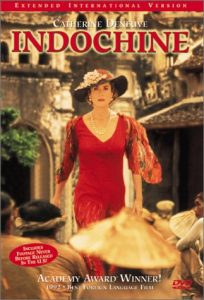Indochine (1992)

The foreign policy in Vietnam opened door for foreigners to travel freely in Vietnam. This created many opportunities for them to re-visited their memory creating Indochina glory days of imperialism. Indochine is a 1992 French production directed by Regis Wargnier that considered one of the first films presents Vietnam in media form.
Despite the film, Indochine has done a better job of being the mix from both colonized’s and colonizer’s views; it depicts French in a positive way especially in the ending. The film opens in the 1930s and ends with the Geneva Conference in 1954 as a consequence of the famous victory of Dien Bien Phu for Vietnamese people. Through this film, viewers can recognize the film’s representation of the French colonizers as dominant, wealthy, and exploitative. For example, Elaine’s character represents France. She is a strong and independent woman, who falls in love with a French officer, Jean-Baptiste. Camille represents Vietnam, who also has a love interest with Jean-Baptiste and they have a baby boy, named Etienne. The adoption of Camille can be seen as a metaphor for colonialism as to how French viewed themselves more superior, and it was a mission for French to civilize to “Other”.[1]
Camille is a princess, a symbol of Vietnam monarchy power, but the adoption changes her identity as well as the acceptance of Vietnamese people to French colonial rule. Her character represents the colonized’s view of a Vietnamese woman, which also becomes the main message in this film about Vietnamese nationalism. As the story unfolds, Camille denies her privileges to become a nationalist and joins the resistance movement. The portrayal of her new identity demonstrates a patriotism love and her determination to fight for her country. Camille ends her arrange marriage shortly after the wedding because she realizes she is in love with Jean-Baptiste. Her journey to find Jean changes her perspective of colonization because she witnesses what the French have done to her people and country. After all, she is the princess; it is her identity.
Elaine’s character is depicted as a good mother, who is concerned about her daughter’s safety. This foreshadows that Elaine as France, and Camille as Vietnam. France had nothing but good intentions in helping Vietnam to grow into a strong nation.
The ironic of Indochine is in the last scene, when Camille comes to France for a peace conference, her son Etienne goes to the negotiators’ hotel but cannot unite with Camille and then tells Eliane that she is his mother. This dramatic scene creates a sympathy feeling for the French, especially through Eliane’s character; however, by looking at a different perspective, viewers should be more sympathetic for Camille. It is unnatural for a mother to abandon her child but Camille did it for a noble reason. As a princess, Camille is a symbol of hope of the country, a daughter to her country, and she has her own political agenda – that it is her duty to restore freedom for her country, to become a leader in the resistance movement.
[1] M. Kathryn Edwards, Contesting Indochina: French Remembrance Between Decolonization and Cold War (Oakland: University of California Press, 2016), 202.
![]()
←Back Next →
(Foreign Films) (The Lover 1992)